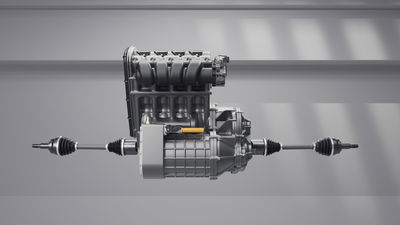That Time A Paper Mill Was Blamed For A Massive Highway Crash

It’s easy to take road safety for granted these days. We like to think that engineers have designed our roadways to take every possible eventuality into account. However, there are some hazards that are simply difficult to predict, and even harder to adapt to. This fact became tragically profound on the morning of December 11, 1990.
The day started just like any other for people driving along the stretch of Interstate 75 near Calhoun, Tennessee. Although that stretch of highway had a reputation for being prone to accidents, conscientious commuters didn’t see anything that would cause concern.

That would change at approximately 9:10 AM, when fog began to blanket the freeway. Although regular commuters were used to occasional fog near the Hiawassee River, this fog was different. It was so thick that anyone caught in it was literally driving blind. Drivers couldn’t see what they were about to hit, let alone be able to react to it while going 70mph. The 99-car chain-reaction collision that followed was inevitable. 42 people were injured, and 12 people lost their lives, making this one of the deadliest car accidents on record.

Naturally, the United States National Transportation Safety Board (NTSB) launched an investigation into the tragic accident. Not surprisingly, they determined that the fog was the primary cause of the crash. Located in the basin of the Cumberland Plateau, the Interstate passed through several marshes and crossed over the Hiawassee River. Evaporation from these watercourses provided the ideal conditions for fog to occur. Indeed, fog was a common issue on that particular stretch of I-75.

But survivors were convinced that there was more to the story than just the weather. In fact, some scientists were just as skeptical. They found it hard to believe that the fog on that morning was a normal occurrence. Supporting this idea was the sudden onset of such a dense fog - just ten minutes before the crash, drivers either reported a very light fog or no fog at all. Survivors and the families of victims wanted to know the answers to two questions: why was the fog on that day so thick; and how could it occur so suddenly?

Scientists working on the NTSB report suspected that industrial activity may have been a factor, and began to investigate the nearby Bowater paper plant. As one of the largest producers of newsprint in the country, the Bowater facility emitted massive amounts of steam and pollutants from its smokestacks. In addition, the facility’s wastewater cooling ponds were located adjacent to I-75. Vapours from both of these sources contained particulates that were ideal for the formation of very thick fog. To make matters worse, the winds on that day would have blown evaporation from the Bowater plant directly toward the crash site. Ultimately, the NTSB concluded that the facility’s warm water cooling ponds may have contributed to the fog, but stopped short of faulting Bowater for the collision.
Bowater denied any responsibility for the accident, claiming that natural fog was a problem long before the factory was even built. Instead, they blamed the State of Tennessee for failing to implement effective fog detection and warning systems on I-75. However, these claims were viewed by many as a feeble deflection by a corporation unwilling to take responsibility for their actions. Bowater would reach a $10 million out-of-court settlement with 44 victims and family members, but continued to deny any wrongdoing. They did, however, agree to limit the usage of Pond #4, the cooling pond located closest to the Interstate.

From a public relations perspective, Bowater never truly recovered from the Calhoun crash of 1990. But their claims against the State of Tennessee turned out to be valid, at least from the perspective of the NTSB. In 1979, after a similar multi-vehicle accident caused by fog, the State identified the stretch of I-75 near Calhoun as a fog-prone area. Their response involved the installation of warning signs before the fog area that would activate flashing amber lights if fog was detected. Prior to the accident, these signs were apparently malfunctioning, and most drivers had ignored them for some time. After the crash, the State of Tennessee settled with the victims and their families out of court, and agreed to install a computerised fog detection system that would automatically close the road to traffic in severe fog conditions.

However, the most important recommendation from the NTSB report was ensuring a uniform procedure for drivers to follow when caught in thick fog or other low-visibility conditions. They determined that the variability in the drivers’ reaction to the fog was responsible for the pile-up. Those who did not slow down or pull over to the hard shoulder weren’t able to see what was ahead of them until it was too late. If you happen to get caught in the fog while driving, the report recommends that you slow down and turn on your low beams; and to pull over on the shoulder and stop if you have no visibility.














Comments
Very interesting thanks! Those poor people and their families! Still amazes me how many people will do crazy things in fog on my countries roads. Flashing you out of the way so they can speed and dangerous overtaking while basically driving blind!! Idiots!
Ikr
I watched a whole documentary about this crash a year ago…
Literally every driver there : oh sheet
damnit i mist my opperunity for that pun
Nooooo, I WOOD have made the same pun, if you hadn’t done it before
Please don’t make jokes about it. People lost their lives in this accident and I doubt their loved ones would be laughing at this.
that time a fireworks display caused a pile up , https://en.wikipedia.org/wiki/2011_M5_motorway_crash
FOG…..Foot Off Gas….Simple.
On my daily commute I pass a paper factory and when they open up their windows to let the steam out of the facility you really can’t see anything. But the traffic on the route is so used to it that nothing happened there in the last 6 years back then there was a minor crash at low speed.
I would say that the warning signs really help at a place like that and would also see the state of Tenessee responsible here.
It still baffles me how a crash like that can happen.. I mean, if the conditions are so poor that you really can’t see a thing, would it really be too much to ask them to slow down? Doesn’t take much, I think about half a functioning brain would do.
Where I live we get fog like that and worse all the time. I mean is it really that hard to slow down and not go 70 when you can’t see a thing!
The idea of a factory always look good in plain…PAPER
It wasn’t the mills fault,its the drivers’ fault.
You see fog, slow the freaking car down not drive it at 70mph.
I was about to say that.
But people just wants someone to blame…
“I’m not a bad driver, the fog is just a bad behaving cloud! it should follow rules and stay in the sky! And who taught the fog bad manners ? look left and right That factory there! “
Psssht this is how it’s like in San Diego during the winter at night all the time
Pagination